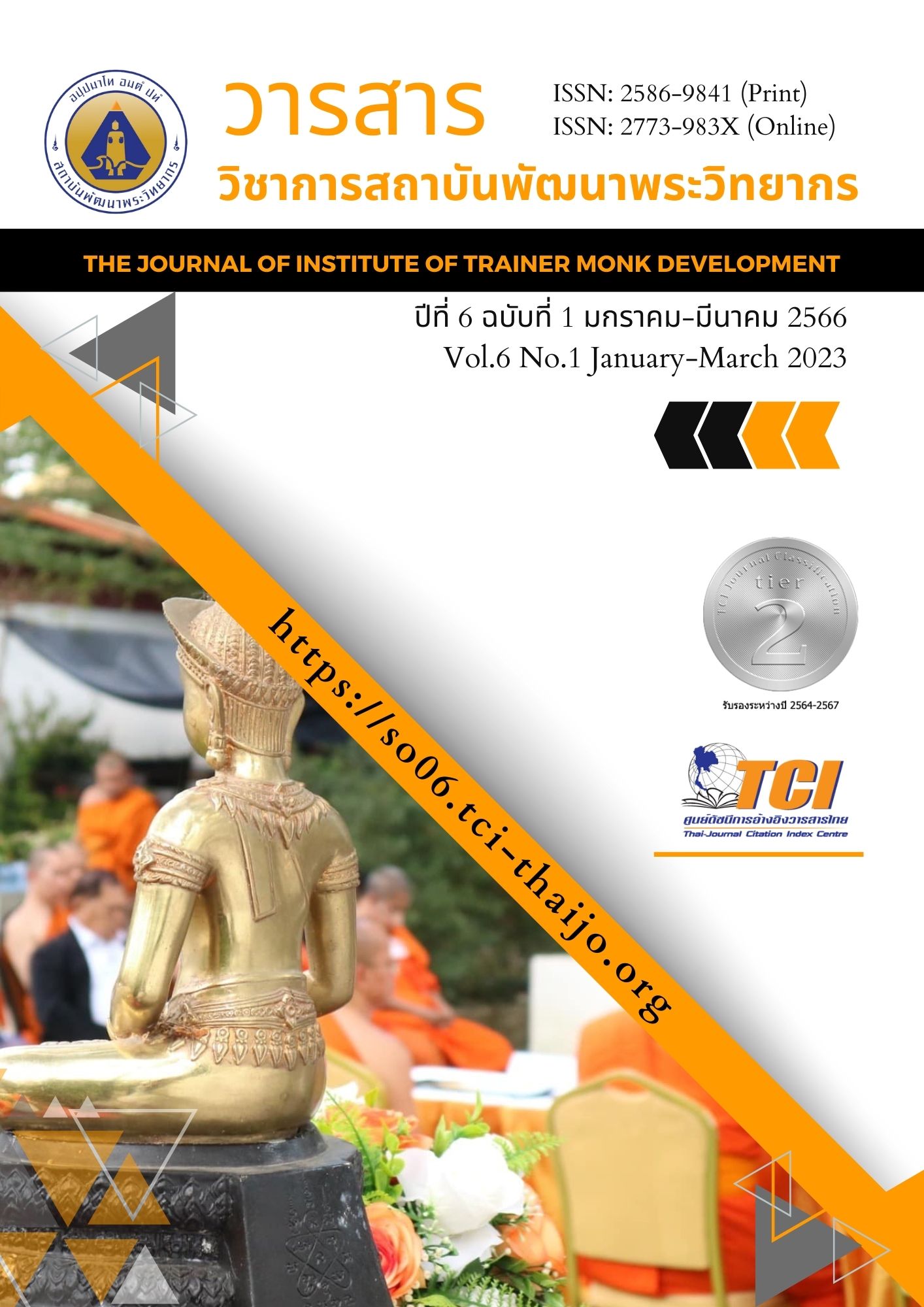Practicing the Brahmavihāra Dhamma Principles to Improve the Quality of Life of Tha Sai Volunteer Prayer Club, Samut Sakhon Province
Main Article Content
Abstract
This research has objectives as follows: 1) to study the practice of the Brahmavihāra Dhamma principles to improve the quality of life of Tha Sai volunteer prayer club Samut Sakhon Province 2) to Compare the practice of the Brahmavihāra Dhamma principles with the development of quality of life of Tha Sai volunteer prayer club Samut Sakhon Province 3) to present guidelines for the practice of the Brahmavihāra Dhamma principles to improve the quality of life of Tha Sai volunteer prayer club Samut Sakhon Province, This study the researcher used a mixed Method by consisting of quantitative research, using a survey eesearch and the sampling group in Tha Sai volunteer prayer club Samut Sakhon Province 120 preyers, the following results have been found: 1) The roles of abbots in administration according to the Buddhist scriptures can be summarized in 6 roles as follows: The results showed that: 1) The practice of the Brahmavihāra Dhamma principles to improve the quality of life of Tha Sai volunteer prayer club Samut Sakhon Province from the analysis results, It was found that overall, It was at a high level of 4.34 when considering each aspect, namely Mettā (=4.37), Karuṇā (=4.25), Muditā (=4.49), Upekkhā (=4.24) at a high level in All aspects. 2) The results of the analysis of the practice of the Brahmavihāra Dhamma principles to improve the quality of life of Tha Sai volunteer prayer club Samut Sakhon Province classified by sex, age, status, educational level, income, participation in activities, different opinions. Statistically Significant at 0.05 level is not different. Therefore, rejecting the hypothesis individuals with different statuses opinions on the practice of the Brahmavihāra Dhamma principles to improve the quality of life of Tha Sai volunteer prayer club Samut Sakhon Provinces are different, Thus, accepting the hypothesis. And 3) The suggestion Guidelines for the Practice of the Brahmavihāra principles to improve the ouality of life of Tha Sai volunteer prayer club Samut Sakhon Province found that; the Brahmavihāra Dhamma principles which consists of Mettā, Karuṇā Muditā, and Upekkhā. It is a principle of the mind, control the mind.
Article Details

This work is licensed under a Creative Commons Attribution-NonCommercial-NoDerivatives 4.0 International License.
บทความที่ได้รับการตีพิมพ์เป็นลิขสิทธิ์ของวารสารวิชาการสถาบันพัฒนาพระวิทยากร
ข้อความที่ปรากฎอยู่ในบทความที่ได้รับการตีพิมพ์ในวารสาร ถือเป็นความรับผิดชอบของผู้เขียนบทความ และข้อคิดเห็นนั้นไม่ถือว่าเป็นทัศนะและความรับผิดชอบของกองบรรณาธิการวารสารวิชาการสถาบันพัฒนาพระวิทยากร
References
พระครูประกาศศาสนกิจ (ณกร ถิ่นสำราญ). (2558). การประยุกต์ใช้หลักพุทธธรรมในการพัฒนาชุมชนของพระสงฆ์ในเขต ตำบลวังดิน อำเภอเมือง จังหวัดอุตรดิตถ์. วิทยานิพนธ์พุทธศาสนามหาบัณฑิต สาขาวิชาพระพุทธศาสนา. บัณฑิตวิทยาลัย: มหาวิทยาลัยมหาจุฬาลงกรณราชวิทยาลัย.
พระปราการ อุคฺคเตโช (เป็งพะยอม). (2564). วิธีการประยุกต์ใช้หลักมุทิตาในพระพุทธศาสนา. วิทยานิพนธ์พุทธศาสตรมหาบัณฑิต สาขาวิชาพระพุทธศาสนา. บัณฑิตวิทยาลัย: มหาวิทยาลัยมหาจุฬาลงกรณราชวิทยาลัย.
พระพรหมคุณาภรณ์ (ป.อ. ปยุตฺโต). (2553). พจนานุกรมพุทธศาสตร์ ฉบับประมวลธรรม. พิมพ์ครั้งที่ 18. กรุงเทพมหานคร: โรงพิมพ์เพิ่มทรัพย์การพิมพ์.
พระมหาสันทัด จันทร์ทาทอง. (2544). หลักคำสอนเรื่องอุเบกขาในพระพุทธศาสนาเถรวาท : ศึกษาเฉพาะกรณี ทรรศนะของพระสงฆ์ในกรุงเทพมหานคร. วิทยานิพนธ์อักษรศาสตรมหาบัณฑิต สาขาศาสนาเปรียบเทียบ. บัณฑิตวิทยาลัย: มหาวิทยาลัยมหิดล.
เพ็ญศรี เปลี่ยนขำ. (2542). การสาธารณสุขมูลฐาน. กรุงเทพมหานคร: โครงการตำราวิชาการราชภัฏเฉลิมพระเกียรติ.
ภัทรพงษ์ ธำมรงค์ปรีชา. (2564). อิทธิพลของความเมตตากรุณาต่อตนเองที่มีต่อความกรุณาต่อผู้อื่นและความสุขของจิตอาสาในกรุงเทพมหานครและเขตปริมณฑล. วิทยานิพนธ์วิทยาศาสตรมหาบัณฑิต สาขาวิชาจิตวิทยาการปรึกษา. บัณฑิตวิทยาลัย: มหาวิทยาลัยเชียงใหม่.
มณีรัตน์ โชติวุฑฒากร. (2548). พระบรมราโชวาทด้านศาสนาและคุณธรรม. ราชบุรี: โรงพิมพ์ศรีอักษร.
สมศักดิ์ ศรีสันติสุข. (2528). สังคมไทย แนวทางวิจัยและการพัฒนา. กรุงเทพมหานคร: แพร่วิทยา.
ไสว มาลาทอง. (2542). คู่มือการศึกษาจริยธรรม สำหรับนักเรียน นิสิต นักศึกษา นักบริหาร นักปกครอง ประชาชนผู้สนใจทั่วไป. กรุงเทพมหานคร: โรงพิมพ์การศาสนา.


